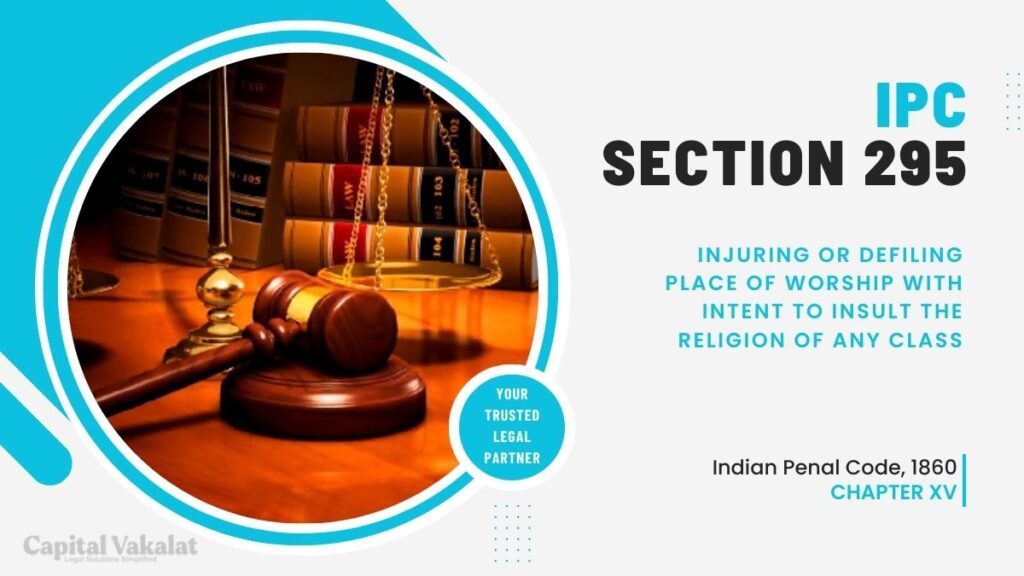In the complex tapestry of Indian legal statutes, Section 295 IPC stands as a sentinel guarding the sanctity of places of worship. This provision holds paramount importance in the legal landscape, as it addresses offenses related to the intentional insult of religious sentiments.

Let’s delve into the intricacies of Section 295 IPC, exploring its historical roots, controversies, global comparisons, enforcement challenges, and its impact on interfaith relations.
Historical Context
To comprehend the essence of Section 295 IPC, it’s imperative to trace its historical roots. The provision, dating back to the colonial era, has undergone several amendments to adapt to the evolving socio-religious milieu. Landmark cases, such as the Rangila Rasul case in 1927, have left an indelible mark on the interpretation and application of this section.
Understanding the Offense
Section 295 IPC encompasses a nuanced set of elements that constitute the offense. The crux lies in the accused’s intent to insult the religion of any class, raising crucial questions about the burden of proof and the delicate balance between freedom of expression and protection of religious sentiments.
Controversies and Interpretations
The legal arena has witnessed heated debates surrounding Section 295 IPC. Notable cases, including the Salman Rushdie affair and the controversy over ‘The Da Vinci Code,’ have sparked discussions about the boundaries of artistic expression and religious sensitivity. The judiciary’s varied interpretations of the section further contribute to the ongoing discourse.
Global Perspective
To contextualize Section 295 IPC, it is enlightening to compare it with similar laws globally. How does India’s legal framework align with international standards on religious freedom? A comparative analysis sheds light on the strengths and shortcomings of Section 295 IPC in a global context.
Challenges in Enforcement
Enforcing Section 295 IPC poses unique challenges to law enforcement agencies. Proving the accused’s intent to insult a religion demands a meticulous examination of motives, often delving into complex psychological realms. The article explores the intricacies faced by investigators and prosecutors in building a robust case.
Impact on Interfaith Relations
The repercussions of Section 295 IPC extend beyond the courtroom, influencing the delicate fabric of interfaith relations. Examining its impact on communal harmony provides insights into the dynamics between religious communities and the measures taken to mitigate potential conflicts.
Critiques and Reforms
No legal provision is immune to criticism, and Section 295 IPC is no exception. The article critically evaluates the shortcomings of the section and considers proposals for reforms or amendments. Can the law strike a more delicate balance between religious sensitivities and freedom of expression?
Landmark Cases
The jurisprudence surrounding Section 295 IPC is shaped by landmark cases that set precedents for future interpretations. An in-depth analysis of key cases provides a comprehensive understanding of the legal evolution and the principles that guide the judiciary in such matters.
Conclusion
In conclusion, Section 295 IPC emerges as a crucial guardian of religious sentiments in a diverse and pluralistic society like India. While the section has weathered its share of controversies, its significance in maintaining communal harmony cannot be overstated. Striking a balance between freedom of expression and religious sensitivity remains a perpetual challenge, requiring a nuanced and evolving legal approach.
Frequently Asked Questions
How does the judiciary determine the intent to insult in Section 295 cases?
The judiciary relies on a careful examination of evidence, context, and intent to establish whether the accused had the deliberate intention to insult a religion.
Are there ongoing efforts to amend Section 295 IPC?
Discussions regarding amendments to Section 295 IPC are recurrent. Various stakeholders debate the need for reforms to strike a better balance between freedom of expression and religious sentiments.
Can Section 295 IPC be misused to stifle legitimate criticism?
There are concerns about potential misuse of Section 295 IPC to stifle legitimate criticism. Striking the right balance between protecting religious sentiments and ensuring freedom of expression remains a challenge.
How does India’s Section 295 IPC compare to blasphemy laws in other countries?
India’s Section 295 IPC has both similarities and differences compared to blasphemy laws in other countries. A comparative analysis provides insights into the global landscape of laws protecting religious sentiments.